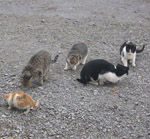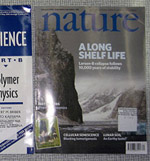Does open-access publishing increase future citations of a study?
 Research
Research Advocates of open access publishing have argued that making scientific studies freely available will expand the dissemination of the research - particularly in developing countries where people and institutions are less likely to afford subscriptions. A new study, however, calls this assumption into question...
Rising ocean temperatures promotes dominance of exotic species
A new study from Northern California finds direct evidence that warming oceans leads to increased dominance of non-native species in coastal marine areas. Researchers collected a number of native and exotic species and subjected the organisms to different water temperature levels in a laboratory setting...
Rapidly mobilizing ecological research after natural disasters
 Research
Research Unexpected natural disturbances like forest fires, tsunamis, and volcanoes can provide unparalleled research opportunities for gaining resource management and ecological insights. Yet these research opportunities create a formidable challenge. Natural disturbances generally occur without much warning...










